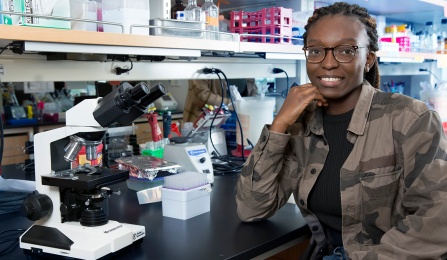Research Opportunities

Gloria Opuni works as a research student in the lab of Jennifer A. Surtees, PhD, associate professor of biochemistry.
The biochemistry major requires you to complete eight credit hours of laboratory research.
A Foundation for Your Research Career
Your course of study in biochemistry will expose you to the ongoing work of all of our faculty. Once you are an approved major, you will take BCH 498 (Undergraduate Research Participation), where you choose a lab to join and get course credit for working as part of its research team.
You will pursue an independent project within the scope of the lab’s work, collaborating with faculty, graduate students, technical staff and postdoctoral fellows. You may conduct hands-on experiments, perform data analysis and help solve research questions.
At the annual Biochemistry Research Day, you will present a poster that describes your research.
Extend Your Knowledge Base
You need a total of eight credits in BCH 498 to complete a biochemistry major. These can be taken over multiple semesters and can include work on multiple projects so you gain breadth as well as depth in your research experience.
Independent Study (BCH 499)
Independent study can also be conducted through BCH 499. You and a faculty member design a project you can complete within a semester. These projects usually culminate in some writing and/or a presentation of your research.
Search for Faculty
Our searchable faculty profiles describe faculty research interests and ongoing projects:
Find a Research Opportunity
You may find a research mentor through several avenues:
Research Opportunity Listings
Faculty who are actively seeking student researchers list their projects in the Experiental Learning Network. The Experiential Learning Network also maintains a listing of summer and national research opportunities.
Collegiate Science and Technology Entry Program (CSTEP)
Students participating in CSTEP can find lab mentors in the biomedical sciences.
Ask Your Professors
Talk to faculty whose science classes you have taken. They may be able to suggest other faculty with whom you might work.
Student Clubs
Student organizations host speakers, facilitate shadowing opportunities and connect you with peers who share your interests—all of which may help you find a project mentor.
Contact Us
For more information about undergraduate research opportunities in biochemistry, contact:
Beth O’Brocta
Assistant to the Chair
Department of Biochemistry